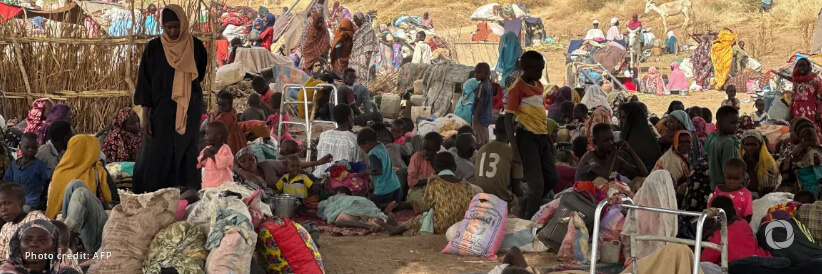As violence intensifies across the South Sudan-Ethiopia border, Doctors Without Borders/Médecins Sans Frontières (MSF) has relocated the medical services from the border town of Burbeiye to Mattar, in Ethiopia.
This move corresponds with a mass displacement of South Sudanese refugees, who had already fled to Burbeiye and are heading further inside Ethiopia after an escalation of fighting at the border and exchange of fire between the South Sudan People’s Defense Forces and an opposition group.
As of May 12, most people fleeing Burbeiye had arrived in Mattar. The staff are on site to respond to a cholera outbreak and meet people’s urgent medical needs.
Cholera and displacement put vulnerable people at risk
Over the past weeks, Ethiopia’s Gambella region has been experiencing both an expanding cholera outbreak in Wanthoa Woreda and a huge influx of refugees arriving because of intense fighting in South Sudan’s Upper Nile and Jonglei states. In the weeks leading up to the displacement, MSF had treated over 1,200 cholera patients and provided more than 3,000 outpatient consultations on the Ethiopian side of Burbeiye.
The situation escalated when cross-border gunfire from South Sudanese forces injured several people in Burbeiye on May 12. MSF received nine war-wounded patients, bringing the total number of injured cases seen in the facility in Burbeiye to 217 since the conflict escalated in South Sudan’s Upper Nile state in February.
“Burbeiye has become critically dangerous,” said Joshua Eckley, MSF head of mission for Ethiopia. “With thousands of refugees fleeing in one night alone, it was clear we had to follow the people and the needs.”
Refugees are fleeing aerial bombardments and other violence
Refugees arriving in Mattar report fleeing aerial bombardments and other violence in the towns of Nasir and Ulang in South Sudan’s Upper Nile state. At least one survivor treated by MSF had severe burn injuries.
“We moved through villages with no clinics, no medicine, not even water. I crossed the river, fled to Burbeiye, and then walked to Mattar. This is not life— his is survival,” said Nyayul, who had originally fled to the Ethiopian side of Burbeiye, and once again fled to Mattar. “When the bombs started falling, everyone ran. I lost my children in the chaos — I only have two with me now. The others, I don’t know where they are.”
Immediate action is needed from donors to fund emergency response, as 35,000 and 85,000 people are estimated to be in Mattar, with most refugees living in makeshift and overcrowded shelters. The local infrastructure is stretched beyond capacity.
Over 40 percent of malaria rapid diagnostic tests have been positive, and nearly 7 percent of children under five show signs of severe acute malnutrition, while among pregnant and lactating women, the rate of global acute malnutrition is even higher, exceeding 14 percent. With waterborne illnesses like cholera and acute watery diarrhea on the rise, the risk of a public health catastrophe is imminent.
MSF’s essential health services in Mattar include mental health care, nutrition screening, and support for victims and survivors of sexual and gender-based violence.
“We need immediate action from donors, the UN, and NGO partners,” said Eckley. “Health care and other essential services are urgently needed, and these communities cannot be left waiting. They’re not just escaping violence; they’re fleeing the complete breakdown of every system that was supposed to protect them.”
MSF calls on all parties involved to ensure a safe humanitarian space and protect civilians and aid workers alike. The organization urges donors to support the efforts and public institutional funders and humanitarian partners to scale up assistance, particularly in Mattar, where shelter, water, and medical care are in too low supply for people who have fled horrific violence.

